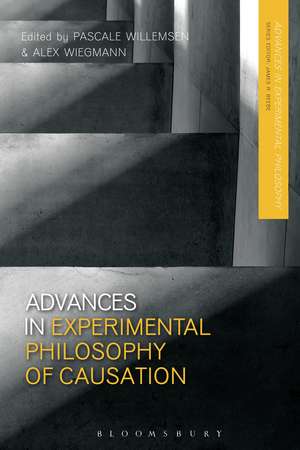Advances in Experimental Philosophy of Causation: Advances in Experimental Philosophy
Editat de Pascale Willemsen, Alex Wiegmannen Limba Engleză Paperback – 24 ian 2024
| Toate formatele și edițiile | Preț | Express |
|---|---|---|
| Paperback (1) | 191.04 lei 43-57 zile | |
| Bloomsbury Publishing – 24 ian 2024 | 191.04 lei 43-57 zile | |
| Hardback (1) | 539.49 lei 43-57 zile | |
| Bloomsbury Publishing – 13 iul 2022 | 539.49 lei 43-57 zile |
Din seria Advances in Experimental Philosophy
- 23%
 Preț: 192.10 lei
Preț: 192.10 lei - 23%
 Preț: 192.82 lei
Preț: 192.82 lei - 30%
 Preț: 511.97 lei
Preț: 511.97 lei - 13%
 Preț: 256.49 lei
Preț: 256.49 lei - 13%
 Preț: 257.03 lei
Preț: 257.03 lei - 22%
 Preț: 257.86 lei
Preț: 257.86 lei - 23%
 Preț: 235.91 lei
Preț: 235.91 lei -
 Preț: 256.38 lei
Preț: 256.38 lei - 22%
 Preț: 256.77 lei
Preț: 256.77 lei - 22%
 Preț: 226.97 lei
Preț: 226.97 lei - 22%
 Preț: 231.06 lei
Preț: 231.06 lei - 21%
 Preț: 219.01 lei
Preț: 219.01 lei - 22%
 Preț: 227.16 lei
Preț: 227.16 lei - 21%
 Preț: 218.18 lei
Preț: 218.18 lei - 23%
 Preț: 190.87 lei
Preț: 190.87 lei - 23%
 Preț: 191.92 lei
Preț: 191.92 lei - 30%
 Preț: 511.23 lei
Preț: 511.23 lei - 30%
 Preț: 511.97 lei
Preț: 511.97 lei - 30%
 Preț: 513.43 lei
Preț: 513.43 lei - 30%
 Preț: 511.64 lei
Preț: 511.64 lei - 30%
 Preț: 510.68 lei
Preț: 510.68 lei -
 Preț: 250.59 lei
Preț: 250.59 lei -
 Preț: 249.46 lei
Preț: 249.46 lei
Preț: 191.04 lei
Preț vechi: 249.20 lei
-23% Nou
Puncte Express: 287
Preț estimativ în valută:
36.56€ • 38.26$ • 30.43£
36.56€ • 38.26$ • 30.43£
Carte tipărită la comandă
Livrare economică 31 martie-14 aprilie
Preluare comenzi: 021 569.72.76
Specificații
ISBN-13: 9781350235847
ISBN-10: 1350235849
Pagini: 224
Ilustrații: 10 bw illus
Dimensiuni: 156 x 234 x 25 mm
Greutate: 0.32 kg
Editura: Bloomsbury Publishing
Colecția Bloomsbury Academic
Seria Advances in Experimental Philosophy
Locul publicării:London, United Kingdom
ISBN-10: 1350235849
Pagini: 224
Ilustrații: 10 bw illus
Dimensiuni: 156 x 234 x 25 mm
Greutate: 0.32 kg
Editura: Bloomsbury Publishing
Colecția Bloomsbury Academic
Seria Advances in Experimental Philosophy
Locul publicării:London, United Kingdom
Caracteristici
Applies empirical methods to philosophical questions about causation in order to drive the field forward
Notă biografică
Pascale Willemsen is a Postdoctoral Researcher in the Institute of Philosophy at the University of Zurich, Switzerland.Alex Wiegmann is a Postdoctoral Researcher in the Emmy Noether Research Group, Experimental Philosophy and the Method of Cases (EXTRA), at the Institute for Philosophy II at Ruhr-University Bochum, Germany.
Cuprins
1. Revisiting Hume in the 21st Century: The Possibility of Generalizable Causal Beliefs Given Inherently Unobservable Causal Relations, Patricia W. Cheng (University of California, Los Angeles, USA) and Nicholas Ichien (University of California, Los Angeles, USA)2. Mysteries of Actual Causation: It's Complicated, James Woodward (University of Pittsburgh, USA)3. Juggling Intuitions about Causation and Omissions, Carolina Sartorio (University of Arizona, USA)4. Causal Perception and Causal Inference: An Integrated Account, David Danks (Carnegie Mellon University, USA) and Ngoc Phuong Dinh (Carnegie Mellon University, USA)5. The Interplay between Covariation, Temporal, and Mechanism Information in Singular Causation Judgments, Simon Stephan (University of Goettingen, Germany) and Michael Waldmann (University of Goettingen, Germany)6. Cause, 'Cause', and Norm, Eric Sievers (Florida State University, USA) and John Schwenkler (Florida State University, USA)7. The Responsibility Account, Justin Sytsma (Victoria University Wellington, New Zealand)8. Causation in the Law, and Experimental Philosophy, Karolina Prochownik (Ruhr-University Bochum, Germany)9. Children and Adults Don't Think They Are Free: A Skeptical Look at Agent Causationism, Kevin Reuter (University of Zurich, Switzerland), Lucas Huber (University of Berne, Switzerland) and Trix Cacchione (University of Applied Sciences and Arts Northwestern Switzerland, Switzerland)Index
Recenzii
Advances in Experimental Philosophy of Causation is an incredibly rich volume, presenting perspectives on many of the most important questions that emerge from humans' fascination with understanding "why?". The interdisciplinary contributors connect causal cognition to an exciting range of approaches and implications, from computational modeling to legal responsibility.
